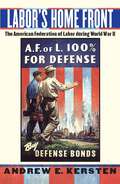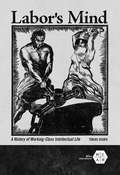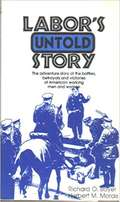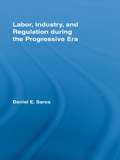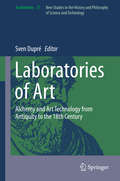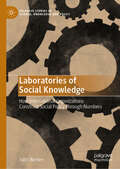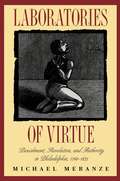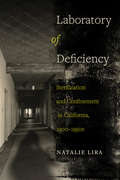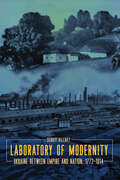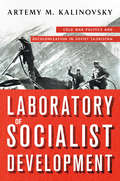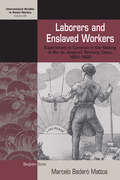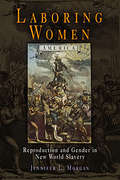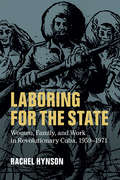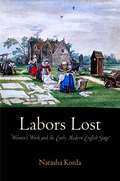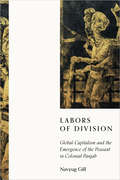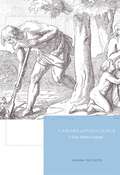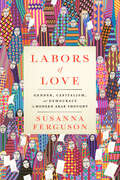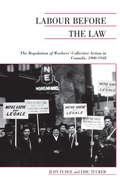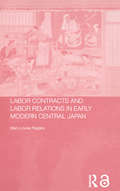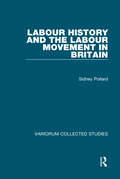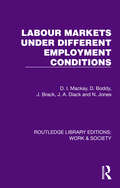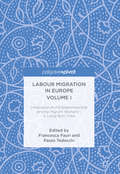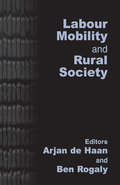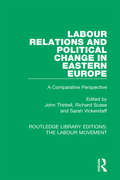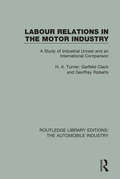- Table View
- List View
Labor's Home Front: The American Federation of Labor during World War II
by Andrew E. KerstenOne of the oldest, strongest, and largest labor organizations in the U.S., the American Federation of Labor (AFL) had 4 million members in over 20,000 union locals during World War II. The AFL played a key role in wartime production and was a major actor in the contentious relationship between the state, organized labor, and the working class in the 1940s. The war years are pivotal in the history of American labor, but books on the AFL’s experiences are scant, with far more on the radical Congress of Industrial Unions (CIO).Andrew E. Kersten closes this gap with Labor’s Home Front, challenging us to reconsider the AFL and its influence on twentieth-century history. Kersten details the union's contributions to wartime labor relations, its opposition to the open shop movement, divided support for fair employment and equity for women and African American workers, its constant battles with the CIO, and its significant efforts to reshape American society, economics, and politics after the war. Throughout, Kersten frames his narrative with an original, central theme: that despite its conservative nature, the AFL was dramatically transformed during World War II, becoming a more powerful progressive force that pushed for liberal change.
Labor's Mind: A History of Working-Class Intellectual Life (Working Class in American History #295)
by Tobias HigbieBusiness leaders, conservative ideologues, and even some radicals of the early twentieth century dismissed working people's intellect as stunted, twisted, or altogether missing. They compared workers toiling in America's sprawling factories to animals, children, and robots. Working people regularly defied these expectations, cultivating the knowledge of experience and embracing a vibrant subculture of self-education and reading. Labor's Mind uses diaries and personal correspondence, labor college records, and a range of print and visual media to recover this social history of the working-class mind. As Higbie shows, networks of working-class learners and their middle-class allies formed nothing less than a shadow labor movement. Dispersed across the industrial landscape, this movement helped bridge conflicts within radical and progressive politics even as it trained workers for the transformative new unionism of the 1930s. Revelatory and sympathetic, Labor's Mind reclaims a forgotten chapter in working-class intellectual life while mapping present-day possibilities for labor, higher education, and digitally enabled self-study.
Labor's Untold Story
by Richard Boyer Herbert MoraisA happy collaboration between Richard O. Boyer, author of The Dark Ship, a study of the Maritime Union, and Dr. Herbert M. Morais, formerly of the history department of the College of the City of New York and a specialist in American history, produced this long-needed book. Mr. Boyer, as a member of the staff of The New Yorker, was one of the most successful practitioners of the Profile of that magazine, a technique which he employed to good advantage in Labor’s Untold Story. He wrote John Brown: Profile of a Legend. Dr. Morais was the author of The Struggle for American Freedom, Deism in Eighteenth Century America and The History of the Negro in Medicine.
Labor, Industry, and Regulation during the Progressive Era (New Political Economy)
by Daniel E. SarosThe Progressive Era was among the most volatile times for the economy and labor in American History. Daniel E. Saros explores the institutional and economic conditions of this time, revealing new insight into the regulated nature of industry and the conditions of labor. Using the steel industry as a case study, Saros demonstrates how the United States Steel Corporation enhanced the performance of the steel industry by initiating a price and wage stabilization program. In an effort to combat potential threats from the federal government, the American public, and organized labor to the market stabilization program and mechanization drive, the steel companies introduced a paternalistic welfare program, company unions, and limited hours reform. Saros also contrasts this time with free market periods, examining the impacts on rates of profit, output growth, and capital accumulation.
Laboratories of Art
by Sven DupréThis book explores the interconnections and differentiations between artisanal workshops and alchemical laboratories and between the arts and alchemy from Antiquity to the eighteenth century. In particular, it scrutinizes epistemic exchanges between producers of the arts and alchemists. In the fifteenth and sixteenth centuries the term laboratorium uniquely referred to workplaces in which 'chemical' operations were performed: smelting, combustion, distillation, dissolution and precipitation. Artisanal workshops equipped with furnaces and fire in which 'chemical' operations were performed were also known as laboratories. Transmutational alchemy (the transmutation of all base metals into more noble ones, especially gold) was only one aspect of alchemy in the early modern period. The practice of alchemy was also about the chemical production of things--medicines, porcelain, dyes and other products as well as precious metals and about the knowledge of how to produce them. This book uses examples such as the Uffizi to discuss how Renaissance courts established spaces where artisanal workshops and laboratories were brought together, thus facilitating the circulation of materials, people and knowledge between the worlds of craft (today's decorative arts) and alchemy. Artisans became involved in alchemical pursuits beyond a shared material culture and some crafts relied on chemical expertise offered by scholars trained as alchemists. Above all, texts and books, products and symbols of scholarly culture played an increasingly important role in artisanal workshops. In these workplaces a sort of hybrid figure was at work. With one foot in artisanal and the other in scholarly culture this hybrid practitioner is impossible to categorize in the mutually exclusive categories of scholar and craftsman. By the seventeenth century the expertise of some glassmakers, silver and goldsmiths and producers of porcelain was just as based in the worlds of alchemical and bookish learning as it was grounded in hands-on work in the laboratory. This book suggests that this shift in workshop culture facilitated the epistemic exchanges between alchemists and producers of the decorative arts.
Laboratories of Social Knowledge: How International Organizations Construct Social Policy Through Numbers (Palgrave Studies in Science, Knowledge and Policy)
by John BertenThe book examines the politics of knowledge in global social policy, investigating how international organisations (IOs) have contributed to the emergence and development of social security as a global policy field. It reconstructs the role of numerical knowledge in the International Labour Organization (ILO) and the World Bank, theorising how IOs contribute to epistemic infrastructures of global social security. The book shows how IOs&’ knowledge production has led to a continuous refinement of the meaning and purpose of social security. First, it reveals how IOs arrived at a shared conception of social security: what the book calls an ontological framework. Second, it traces how numbers have increasingly enabled the assessment of countries according to shared benchmarks: what the book calls an evaluative framework. The author demonstrates the political and epistemic work involved in universalising knowledge of social security, while highlighting the limits of governing by numbers in global social policy.
Laboratories of Virtue
by Michael MeranzeMichael Meranze uses Philadelphia as a case study to analyze the relationship between penal reform and liberalism in early America. In Laboratories of Virtue, he interprets the evolving system of criminal punishment as a microcosm of social tensions that characterized the early American republic. Engaging recent work on the history of punishment in England and continental Europe, Meranze traces criminal punishment from the late colonial system of publicly inflicted corporal penalties to the establishment of penitentiaries in the Jacksonian period. Throughout, he reveals a world of class difference and contested values in which those who did not fit the emerging bourgeois ethos were disciplined and eventually segregated. By focusing attention on the system of public penal labor that developed in the 1780s, Meranze effectively links penal reform to the development of republican principles in the Revolutionary era. His study, richly informed by Foucaultian and Freudian theory, departs from recent scholarship that treats penal reform as a nostalgic effort to reestablish social stability. Instead, Meranze interprets the reform of punishment as a forward-looking project. He argues that the new disciplinary practices arose from the reformers' struggle to contain or eliminate contradictions to their vision of an enlightened, liberal republic.
Laboratory of Deficiency: Sterilization and Confinement in California, 1900–1950s (Reproductive Justice: A New Vision for the 21st Century #6)
by Natalie LiraPacific Colony, a Southern California institution established to care for the "feebleminded," justified the incarceration, sterilization, and forced mutilation of some of the most vulnerable members of society from the 1920s through the 1950s. Institutional records document the convergence of ableism and racism in Pacific Colony. Analyzing a vast archive, Natalie Lira reveals how political concerns over Mexican immigration—particularly ideas about the low intelligence, deviant sexuality, and inherent criminality of the "Mexican race"—shaped decisions regarding the treatment and reproductive future of Mexican-origin patients. Laboratory of Deficiency documents the ways Mexican-origin people sought out creative resistance to institutional control and offers insight into how race, disability, and social deviance have been called upon to justify the confinement and reproductive constraint of certain individuals in the name of public health and progress.
Laboratory of Modernity: Ukraine between Empire and Nation, 1772–1914
by Serhiy BilenkyWhen the powers of Europe were at their prime, present-day Ukraine was divided between the Austrian and Russian empires, each imposing different political, social, and cultural models on its subjects. This inevitably led to great diversity in the lives of its inhabitants, shaping modern Ukraine into the multiethnic country it is today.Making innovative use of methods of social and cultural history, gender studies, literary theory, and sociology, Laboratory of Modernity explores the history of Ukraine throughout the long nineteenth century and offers a unique study of its pluralistic society, culture, and political scene. Despite being subjected to different and conflicting power models during the nineteenth and early twentieth centuries, Ukraine was not only imagined as a distinct entity with a unique culture and history but was also realized as a set of social and political institutions. The story of modern Ukraine is geopolitically complex, encompassing the historical narratives of several major communities – including ethnic Ukrainians, Poles, Jews, and Russians – who for centuries lived side by side. The first comprehensive study of nineteenth-century Ukraine in English, Laboratory of Modernity traces the historical origins of some of the most pressing issues facing Ukraine and the international community today.
Laboratory of Socialist Development: Cold War Politics and Decolonization in Soviet Tajikistan
by Artemy M. KalinovskyArtemy Kalinovsky’s Laboratory of Socialist Development investigates the Soviet effort to make promises of decolonization a reality by looking at the politics and practices of economic development in central Asia between World War II and the collapse of the Soviet Union. Focusing on the Tajik Soviet Socialist Republic, Kalinovsky places the Soviet development of central Asia in a global context.Connecting high politics and intellectual debates with the life histories and experiences of peasants, workers, scholars, and engineers, Laboratory of Socialist Development shows how these men and women negotiated Soviet economic and cultural projects in the decades following Stalin’s death. Kalinovsky’s book investigates how people experienced new cities, the transformation of rural life, and the building of the world’s tallest dam. Kalinovsky connects these local and individual moments to the broader context of the Cold War, shedding new light on how paradigms of development change over time. Throughout the book, he offers comparisons with experiences in countries such as India, Iran, and Afghanistan, and considers the role of intermediaries who went to those countries as part of the Soviet effort to spread its vision of modernity to the postcolonial world.Laboratory of Socialist Development offers a new way to think about the post-war Soviet Union, the relationship between Moscow and its internal periphery, and the interaction between Cold War politics and domestic development. Kalinovsky’s innovative research pushes readers to consider the similarities between socialist development and its more familiar capitalist version.
Laborers and Enslaved Workers: Experiences in Common in the Making of Rio de Janeiro's Working Class, 1850-1920
by Marcelo Badaró MattosFrom the middle of the nineteenth century until the 1888 abolition of slavery in Brazil, Rio de Janeiro was home to the largest urban population of enslaved workers anywhere in the Americas. It was also the site of an incipient working-class consciousness that expressed itself across seemingly distinct social categories. In this volume, Marcelo Badaró Mattos demonstrates that these two historical phenomena cannot be understood in isolation. Drawing on a wide range of historical sources, Badaró Mattos reveals the diverse labor arrangements and associative life of Rio's working class, from which emerged the many strategies that workers both free and unfree pursued in their struggles against oppression.
Laboring Women: Reproduction and Gender in New World Slavery
by Jennifer L. MorganWhen black women were brought from Africa to the New World as slave laborers, their value was determined by their ability to work as well as their potential to bear children, who by law would become the enslaved property of the mother's master. In Laboring Women: Reproduction and Gender in New World Slavery, Jennifer L. Morgan examines for the first time how African women's labor in both senses became intertwined in the English colonies. Beginning with the ideological foundations of racial slavery in early modern Europe, Laboring Women traverses the Atlantic, exploring the social and cultural lives of women in West Africa, slaveowners' expectations for reproductive labor, and women's lives as workers and mothers under colonial slavery.Challenging conventional wisdom, Morgan reveals how expectations regarding gender and reproduction were central to racial ideologies, the organization of slave labor, and the nature of slave community and resistance. Taking into consideration the heritage of Africans prior to enslavement and the cultural logic of values and practices recreated under the duress of slavery, she examines how women's gender identity was defined by their shared experiences as agricultural laborers and mothers, and shows how, given these distinctions, their situation differed considerably from that of enslaved men. Telling her story through the arc of African women's actual lives—from West Africa, to the experience of the Middle Passage, to life on the plantations—she offers a thoughtful look at the ways women's reproductive experience shaped their roles in communities and helped them resist some of the more egregious effects of slave life.Presenting a highly original, theoretically grounded view of reproduction and labor as the twin pillars of female exploitation in slavery, Laboring Women is a distinctive contribution to the literature of slavery and the history of women.
Laboring for the State: Women, Family, and Work in Revolutionary Cuba, 1959–1971 (Cambridge Latin American Studies #117)
by Rachel HynsonContrary to claims that socialism opposed the family unit, Rachel Hynson argues that the revolutionary Cuban government engaged in social engineering to redefine the nuclear family and organize citizens to serve the state. Drawing on Cuban newspapers and periodicals, government documents and speeches, long-overlooked laws, and oral histories, Hynson reveals that by 1961, and increasingly throughout this decade, revolutionary citizenship was earned through labor. While men were to work outside the home in state-approved jobs, women found their citizenship tied to affording the state control over their reproduction and sexual labor. Through all four campaigns examined in this book - the projects to control women's reproduction, promote marriage, end prostitution, and compel men into state-sanctioned employment - Hynson shows that the state's progression toward authoritarianism and its attendant monopolization of morality were met with resistance and counter-narratives by citizens who so opposed the mandates of these campaigns that Cuban leadership has since reconfigured or effaced these programs from the Revolution's grand narrative.
Labors Lost: Women's Work and the Early Modern English Stage
by Natasha KordaLabors Lost offers a fascinating and wide-ranging account of working women's behind-the-scenes and hitherto unacknowledged contributions to theatrical production in Shakespeare's time. Natasha Korda reveals that the purportedly all-male professional stage relied on the labor, wares, ingenuity, and capital of women of all stripes, including ordinary crafts- and tradeswomen who supplied costumes, props, and comestibles; wealthy heiresses and widows who provided much-needed capital and credit; wives, daughters, and widows of theater people who worked actively alongside their male kin; and immigrant women who fueled the fashion-driven stage with a range of newfangled skills and commodities. Combining archival research on these and other women who worked in and around the playhouses with revisionist readings of canonical and lesser-known plays, Labors Lost retrieves this lost history by detailing the diverse ways women participated in the work of playing, and the ways male players and playwrights in turn helped to shape the cultural meanings of women's work. Far from a marginal phenomenon, the gendered division of theatrical labor was crucial to the rise of the commercial theaters in London and had an influence on the material culture of the stage and the dramatic works of Shakespeare and his contemporaries.
Labors of Division: Global Capitalism and the Emergence of the Peasant in Colonial Panjab (South Asia in Motion)
by Navyug GillOne of the most durable figures in modern history, the peasant has long been a site of intense intellectual and political debate. Yet underlying much of this literature is the assumption that peasants simply existed everywhere, a general if not generic group, traced backward from modernity to antiquity. Focused on the transformation of Panjab during the nineteenth and early twentieth centuries, this book accounts for the colonial origins of global capitalism through a radical history of the concept of "the peasant," demonstrating how seemingly fixed hierarchies were in fact produced, legitimized, and challenged within the preeminent agricultural region of South Asia. Navyug Gill uncovers how and why British officials and ascendant Panjabis disrupted existing forms of identity and occupation to generate a new agrarian order in the countryside. The notion of the hereditary caste peasant engaged in timeless cultivation thus emerged, paradoxically, as a result of a dramatic series of conceptual, juridical, and monetary divisions. Far from archaic relics, this book ultimately reveals both the landowning peasant and landless laborer to be novel political subjects forged through the encounter between colonialism and struggles over culture and capital within Panjabi society. Questions of progress, exploitation and knowledge come to animate the vernacular operations of power. With this history, Gill brings difference and contingency to understandings of the global past in order to re-think the itinerary of comparative political economy as well as alternative possibilities for emancipatory futures.
Labors of Innocence in Early Modern England
by Joanna PicciottoIn seventeenth-century England, intellectuals of all kinds discovered their idealized self-image in the Adam who investigated, named, and commanded the creatures. Reinvented as the agent of innocent curiosity, Adam was central to the project of redefining contemplation as a productive and public labor. It was by identifying with creation’s original sovereign, Joanna Picciotto argues, that early modern scientists, poets, and pamphleteers claimed authority as both workers and “public persons.” Tracking an ethos of imitatio Adami across a wide range of disciplines and devotions, Picciotto reveals how practical efforts to restore paradise generated the modern concept of objectivity and a novel understanding of the author as an agent of estranged perception. Finally, she shows how the effort to restore Adam as a working collective transformed the corpus mysticum into a public. Offering new readings of key texts by writers such as Robert Hooke, John Locke, Andrew Marvell, Joseph Addison, and most of all John Milton, Labors of Innocence in Early Modern England advances a new account of the relationship between Protestantism, experimental science, the public sphere, and intellectual labor itself.
Labors of Love: Gender, Capitalism, and Democracy in Modern Arab Thought
by Susanna FergusonHow to raise a child became a central concern of intellectual debate from Cairo to Beirut over the course of the late nineteenth and early twentieth centuries. Intimately linked with discussions around capitalism and democracy, considerations about women, gender, and childrearing emerged as essential to modern social theory. Arab writers, particularly women, made sex, the body, and women's ethical labor central to fending off European imperial advances, instituting representative politics, and managing social order. Labors of Love traces the political power of motherhood and childrearing in Arabic thought. Susanna Ferguson reveals how debates around raising children became foundational to feminist, Islamist, and nationalist politics alike—opening up conversations about civilization, society, freedom, temporality, labor, and democracy. While these debates led to expansions in girls' education and women writers' authority, they also attached the fate of nations to women's unwaged labor in the home. Ferguson thus reveals why women and the family have been stumbling blocks for representative regimes around the world. She shows how Arab women's writing speaks to global questions—the devaluation of social reproduction under capitalism, the stubborn maleness of the liberal subject, and why the naturalization of embodied, binary gender difference has proven so difficult to overcome.
Labour Before the Law
by Judy Fudge Eric TuckerIn this groundbreaking study of the relations between workers and the state, Judy Fudge and Eric Tucker examine the legal regulation of workers' collective action from 1900 to 1948. They analyze the strikes, violent confrontations, lockouts, union organizing drives, legislative initiatives, and major judicial decisions that transformed the labour relations regime of liberal voluntarism, which prevailed in the later part of the nineteenth century, into industrial voluntarism, whose centrepiece was Mackenzie King's Industrial Disputes Investigation Act of 1907. This period was marked by coercion and compromise, as workers organized and fought to extend their rights against the profit oriented owners of capital, while the state struggled to define a labour regime that contained industrial conflict. The authors then trace the conflicts that eventually produced the industrial pluralism that Canadians have known in more recent years.By 1948 a detailed set of legal rules and procedures had evolved and achieved a hegemonic status that no prior legal regime had even approached. This regime has become so central to our everyday thinking about labour relations that one might be forgiven for thinking that everything that came earlier was, truly, before the law. But, as Labour Before the Law demonstrates, workers who acted collectively prior to 1948 often found themselves before the law, whether appearing before a magistrate charged with causing a disturbance, facing a superior court judge to oppose an injunction, or in front of a board appointed pursuant to a statutory scheme that was investigating a labour dispute and making recommendations for its resolution.The book is simultaneously a history of law, aspects of the state, trade unions and labouring people, and their interaction within the broad and shifting terrain of political economy. The authors are attentive to regional differences and sectoral divergences, and they attempt to address the fragmentation of class experience.
Labour Contracts and Labour Relations in Early Modern Central Japan (Changing Labour Relations in Asia)
by Mary Louise NagataBased on a collection of labour contracts and other documents, this book examines the legal, economic and social relations of labour as they developed in the commercial enterprises of Tokugawa Japan. The urban focus is Kyoto, the cultural capital and smallest of the three great cities of the Tokugawa period, but the data comes from a wider region of commercial and castle towns and rural villages in central Japan.
Labour History and the Labour Movement in Britain (Variorum Collected Studies)
by Sidney PollardThis volume focuses on labour history in Britain, but brings in comparative material on the Continent, in particular inter-war Germany. Special attention is given to wages and living and working conditions in the 19th century, to Robert Owen and Co-operation, and to the modern trade union movement and its attempts to keep up the interests of its members in the fluctuating conditions of the late 19th and earlier 20th centuries. The author defends the notion that wage-earners have common interests and frequently share common experiences, and that their organisations have both a strictly economic aspect (trade unions) and a wider political dimension. The profound changes which the labour organisations underwent in the 19th and 20th centuries are a major concern of these essays.
Labour Markets Under Different Employment Conditions (Routledge Library Editions: Work & Society)
by D. Boddy N. Jones D. I. Mackay J. Brack J. A. DiackOriginally published in 1971, this wide-ranging study illuminates many crucial wage and employment issues by examining the operation of local labour markets and by testing labour market theory against the observed behaviour of employers and employees in different labour market environments. It is based on an empirical investigation of engineering plants both in major conurbations and in smaller labour market areas. There is an emphasis on measurement and quantification, which provides a fund of information on such subjects as wage structures, labour turnover, recruitment and mobility, internal labour markets, manpower forecasting, apprentice training and redundancy. The authors outline the weaknesses of applying economic theory to labour market behaviour.
Labour Migration in Europe Volume I: Integration and Entrepreneurship among Migrant Workers – A Long-Term View
by Francesca Fauri Paolo TedeschiIn this book, Fauri and Tedeschi bring together contributions that outline the movement of job seekers and ethnic minority entrepreneurs in Europe, to analyse the overall impact of different forms of migration on European economies in the last 100 years. Contributions address a broad range of themes, from the motivations of migrants and the process of their integration into their destination country, to their overall social and economic impact onto said country at a structural level. In addressing questions as to why some ethnic groups seem to compete more successfully in business, as well as addressing questions about how skilled labour can be attracted and retained, this volume forms part of a very important multidisciplinary dialogue on labour migration. The policy implications of answering such questions are also discussed, as contributors ultimately examine whether skills-dependent migration policy needs to form part of a common strategy, either at a national or an international level.
Labour Mobility and Rural Society
by Arjan De Haan Ben RogalyComprising seven edited pieces of detailed empirical work drawn from recent research, this title reveals the dynamics behind the movements of poor people in South and South East Asia and Africa.
Labour Relations and Political Change in Eastern Europe: A Comparative Perspective (Routledge Library Editions: The Labour Movement #39)
by Stephen G. JonesFirst published in 1995. This volume offers a comparative perspective on labour relations and political change in eastern Europe within a common theoretical and empirical framework. Its coverage includes Bulgaria, and Czech and Slovak republics, Hungary, Poland, and Russia. Particular attention is given to the dynamics of changes in labour relations and privatisation, which are now critical to the more general process of political and economic transformation. This title will be of interest to scholars and students of politics, sociology and modern history.
Labour Relations in the Motor Industry: A Study of Industrial Unrest and an International Comparison (Routledge Library Editions: The Automobile Industry)
by Geoffrey Roberts H. A. Turner Garfield ClackThis book, originally published in 1967, takes the automobile industry experience as a basis for a wider view of industrial relations, trends and developments of the 1950s and 60s. The study also analyses the emergence of new institutions and systems of labour-management relationships. It contains chapters on the effects of automotion and technical change, on the impact of fluctuations in the market for cars and on wage trends. There are detailed surveys of some of the biggest post-war disputes and especially of trade union organization, the shop steward system, the experience of individual firms, such as Austin, Ford and Fiat. There is also a comparative survey of labour relationships in other major car manufacturing countries such as the USA, Germany and Japan.
